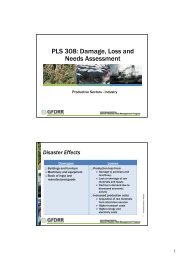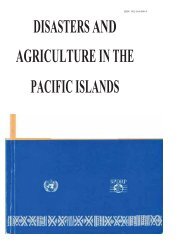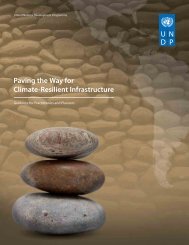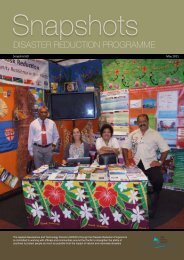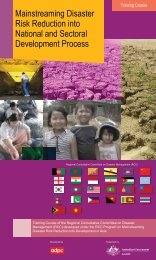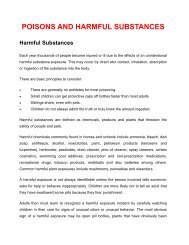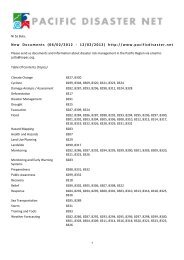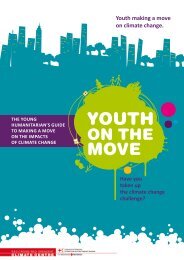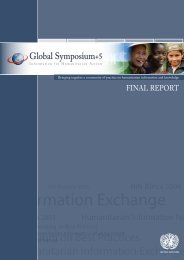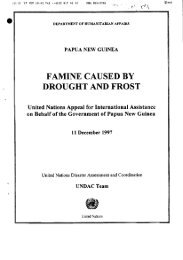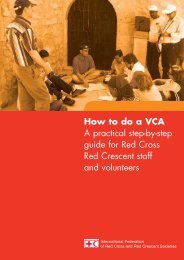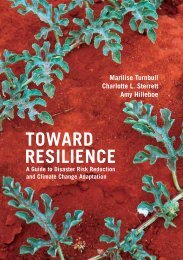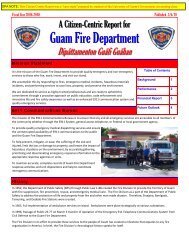A global review of disaster reduction initiatives - Welcome to the ...
A global review of disaster reduction initiatives - Welcome to the ...
A global review of disaster reduction initiatives - Welcome to the ...
Create successful ePaper yourself
Turn your PDF publications into a flip-book with our unique Google optimized e-Paper software.
ter. By working <strong>to</strong>ge<strong>the</strong>r with communities,CDRN has developed strategies <strong>to</strong> enhancepeople’s capacities through community organizing,forming village-level <strong>disaster</strong> response committees,developing local early warning systems,organizing rescue teams and diversifying localsources <strong>of</strong> livelihoods. Receiving little externalsupport from donor agencies, it has reachedhundreds <strong>of</strong> villages and initiated communitybased<strong>disaster</strong> mitigation <strong>initiatives</strong>.Case: BangladeshTo reduce <strong>the</strong> vulnerability <strong>of</strong> flood-prone communitiesin <strong>the</strong> Tongi and Gaibandha municipalities<strong>of</strong> Bangladesh, CARE Bangladesh hasadopted a community-based approach workingin collaboration with partner NGOs in <strong>the</strong>municipalities and with <strong>the</strong> Disaster ManagementBureau <strong>of</strong> <strong>the</strong> Government <strong>of</strong> Bangladesh.This urban <strong>disaster</strong> mitigation project, fundedby OFDA/USAID and managed by ADPC’sAsian Urban Disaster Mitigation Programme,began by motivating community volunteers <strong>to</strong>conduct baseline surveys and vulnerabilityassessments. Through this initial activity, differentcommunity groups recognized <strong>the</strong> importance<strong>of</strong> <strong>the</strong>ir joint community participation andhow each could contribute <strong>to</strong> practical risk<strong>reduction</strong> activities. This project emphasized <strong>the</strong>importance <strong>of</strong> promoting hazard and riskawareness among community groups andsought <strong>to</strong> involve collabora<strong>to</strong>rs in o<strong>the</strong>r subjectareas by placing community-based <strong>disaster</strong> riskmanagement issues on <strong>the</strong> political agenda.Since 1998, in order <strong>to</strong> promote communityawareness about <strong>the</strong> value <strong>of</strong> <strong>disaster</strong> risk <strong>reduction</strong>,<strong>the</strong> government <strong>of</strong> Bangladesh has designated<strong>the</strong> last working day <strong>of</strong> March as NationalDisaster Preparedness Day. In 2001, thisnational day was organized jointly by <strong>the</strong> Tongiand Gaibandha Municipality Disaster ManagementCommittees, CARE Bangladesh ando<strong>the</strong>r partner NGOs.Case: ZimbabwePolicy and public commitment: <strong>the</strong> foundation <strong>of</strong> <strong>disaster</strong> risk <strong>reduction</strong>streng<strong>the</strong>n drought mitigation in Zimbabwe.The current members, ENDA, ORAP,ZFFHC, World Vision and Zimbabwe Projectsstrive <strong>to</strong> implement joint communitybasedrisk <strong>reduction</strong> projects, conduct publicdebates on drought mitigation, and produceand distribute <strong>the</strong> Living with Drought newsletter.These efforts seek <strong>to</strong> share lessons that havebeen learned and recent scientific researchresults related <strong>to</strong> <strong>disaster</strong> <strong>reduction</strong>. Meetingsare also convened between rural farmers, scientistsand innovative farmers.A similar regional network is <strong>the</strong> anticipatedSou<strong>the</strong>rn African Drought Technology Network. Itwill work <strong>to</strong> facilitate <strong>the</strong> sharing <strong>of</strong> informationamong small-scale farmers, NGOs and community-basedorganizations working with ruralfood security, agricultural research institutions,agricultural extension work, and agribusinesson drought-coping strategies that are responsive<strong>to</strong> <strong>the</strong> needs <strong>of</strong> <strong>the</strong> rural poor. Communitybased<strong>disaster</strong> risk <strong>reduction</strong> <strong>initiatives</strong> are welldeveloped in Zimbabwe, but documentation <strong>of</strong>successful practices must still be improved. Itwill be important <strong>to</strong> complement this with fur<strong>the</strong>rresearch <strong>to</strong> feed in<strong>to</strong> <strong>the</strong> national <strong>disaster</strong>management plans and strategies.Case: GermanyThe Community Action Group for Floodwater in<strong>the</strong> Old Community <strong>of</strong> Rodenkirchen (BürgerinitiativeHochwasser, Altgemeinde Rodenkirchen) isa non-pr<strong>of</strong>it association in a district <strong>of</strong>Cologne, founded after <strong>the</strong> severe flooding <strong>of</strong><strong>the</strong> Rhine River in 1993 and 1995. This self-“We are convinced that protection against flooding canonly be successful in <strong>the</strong> long-term if all inhabitantsalong <strong>the</strong> river perceive <strong>the</strong>mselves as a communityworking in solidarity with each o<strong>the</strong>r. As we ourselveshave experienced with our own considerable efforts and<strong>the</strong> many setbacks we have suffered, acting <strong>to</strong>ge<strong>the</strong>rdoes not come naturally but, ra<strong>the</strong>r, it is a product <strong>of</strong>knowledge, experience and conviction, mediatedthrough communication – and this is best achievedthrough personal contacts.”3The Community Drought Mitigation Partners’Network is an NGO network chaired by <strong>the</strong>local NGO SAFIRE and aims <strong>to</strong> promote andSpeaker for Community Action Group for Floodwater in <strong>the</strong>Old Community <strong>of</strong> Rodenkirchen, Cologne, Germany145



